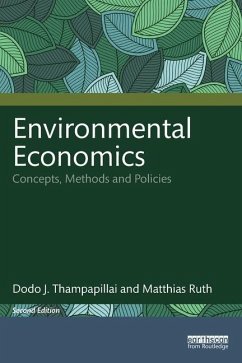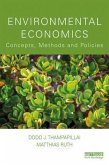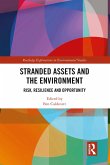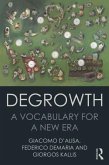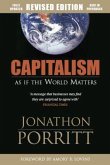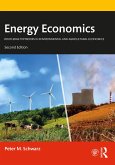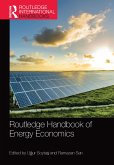Dodo J. Thampapillai, Matthias Ruth (United Kingdom University of York)
Environmental Economics
Concepts, Methods and Policies
Dodo J. Thampapillai, Matthias Ruth (United Kingdom University of York)
Environmental Economics
Concepts, Methods and Policies
- Broschiertes Buch
- Merkliste
- Auf die Merkliste
- Bewerten Bewerten
- Teilen
- Produkt teilen
- Produkterinnerung
- Produkterinnerung
Environmental Economics explores the ways in which economic theory and its applications, as practised and taught today, must be modified to explicitly accommodate the goal of sustainability and the vital role played by environmental capital.
Andere Kunden interessierten sich auch für
![Environmental Economics Environmental Economics]() Dodo J. ThampapillaiEnvironmental Economics76,99 €
Dodo J. ThampapillaiEnvironmental Economics76,99 €![Stranded Assets and the Environment Stranded Assets and the Environment]() Stranded Assets and the Environment45,99 €
Stranded Assets and the Environment45,99 €![Degrowth Degrowth]() Degrowth60,99 €
Degrowth60,99 €![Environmental Economics and Natural Resource Management Environmental Economics and Natural Resource Management]() David A. Anderson (Centre College, Kentucky, USA)Environmental Economics and Natural Resource Management82,99 €
David A. Anderson (Centre College, Kentucky, USA)Environmental Economics and Natural Resource Management82,99 €![Capitalism as If the World Matters Capitalism as If the World Matters]() Jonathon PorrittCapitalism as If the World Matters56,99 €
Jonathon PorrittCapitalism as If the World Matters56,99 €![Energy Economics Energy Economics]() Peter M. SchwarzEnergy Economics67,99 €
Peter M. SchwarzEnergy Economics67,99 €![Routledge Handbook of Energy Economics Routledge Handbook of Energy Economics]() Routledge Handbook of Energy Economics48,99 €
Routledge Handbook of Energy Economics48,99 €-
-
-
Environmental Economics explores the ways in which economic theory and its applications, as practised and taught today, must be modified to explicitly accommodate the goal of sustainability and the vital role played by environmental capital.
Hinweis: Dieser Artikel kann nur an eine deutsche Lieferadresse ausgeliefert werden.
Hinweis: Dieser Artikel kann nur an eine deutsche Lieferadresse ausgeliefert werden.
Produktdetails
- Produktdetails
- Verlag: Taylor & Francis Ltd
- 2 ed
- Seitenzahl: 358
- Erscheinungstermin: 27. November 2024
- Englisch
- Abmessung: 233mm x 157mm x 22mm
- Gewicht: 568g
- ISBN-13: 9781032528267
- ISBN-10: 1032528265
- Artikelnr.: 71183950
- Herstellerkennzeichnung
- Libri GmbH
- Europaallee 1
- 36244 Bad Hersfeld
- gpsr@libri.de
- Verlag: Taylor & Francis Ltd
- 2 ed
- Seitenzahl: 358
- Erscheinungstermin: 27. November 2024
- Englisch
- Abmessung: 233mm x 157mm x 22mm
- Gewicht: 568g
- ISBN-13: 9781032528267
- ISBN-10: 1032528265
- Artikelnr.: 71183950
- Herstellerkennzeichnung
- Libri GmbH
- Europaallee 1
- 36244 Bad Hersfeld
- gpsr@libri.de
Dodo J. Thampapillai is an honorary professor in the School of Natural Sciences at Macquarie University, where he previously held a personal chair in environmental economics. He is currently a senior fellow in executive education at the Lee Kuan Yew School of Public Policy, National University of Singapore, where he was previously a professor. He also held Visiting Professorships/Fellowships at Simon Fraser University, Swedish University of Agricultural Sciences, Christian Albrechts University of Keil and the Australian National University. Dodo Thampapillai has been teaching economics and environmental economics for over 50 years leading him towards a serious rethink of how economics is taught and practised. Matthias Ruth is Pro-Vice-Chancellor for Research at the University of York, York, United Kingdom. He previously served as Vice-President for Research and Innovation at the University of Alberta, Canada and in various other leadership positions in the USA and with academic appointments in numerous fields, including economics, engineering, geography, public policy and urban affairs. His research focuses on dynamic modelling of natural resource use, industrial and infrastructure systems analysis and environmental economics and policy. His theoretical work heavily draws on concepts from engineering, economics and ecology, while his applied research utilises methods of non-linear dynamic modelling as well as adaptive and anticipatory management. Applications of his work cover the full spectrum from local to regional, to national and global environmental challenges, as well as the investment and policy opportunities these challenges present.
List of Figures
List of Tables
List of Boxes
Preface
Acknowledgements
PART-I. NATURE-CAPITAL (KN) AND THE ECONOMY
1. KN AND ECONOMICS
Environmental Economics and Economics
KN and Limits to Growth
KN issues of contemporary times
Climate change - The issue of this century
The organisation of this text
REFERENCES
2. THE ECONOMIC SYSTEM REVSED
The Economic System: Standard Version
The Economic System and Materials Balance
The Economy and the Entropy Law
Further Adaptations of the Economic System
Equilibrium in the Adapted System
Concluding Remarks
REVIEW QUESTIONS
REFERENCES
PART-II. MICROECONOMICS AND KN
3. THE MARKET MODEL AND ITS FAILURE
The Functions of the Market
Market demand
Market supply
The market
KN Goods and Market Failure
Price Mechanism and Property Rights
Some Further Issues
REVIEW QUESTIONS
REFERENCES
4. PUBLIC GOODS AND EXTERNALITIES
Public Goods
Externalities
Public Goods and Externalities
Residual Externalities
REVIEW QUESTIONS
REFERENCES
5. ECONOMICS OF RENEWABLE AND NON-RENEWABLE RESOURCES
Objectives of Resource Management
Conflicts between EG and KN-Q Objectives
The framework based on the market model
The framework for conflicts between groups
Conflicts Due to Intergenerational Concern
A framework for non-renewable resources
A framework for renewable resources
Some Resource Management Policies
Renewable resources
Non-renewable resources
REVIEW QUESTIONS
REFERENCES
6. ECONOMICS OF NON-RENEWABLE RESOURCES WITH RENEWABLE SERVICES
A Simple Framework for Pollution Control
Standards
Taxes and charges
Emissions Trading
Net Zero Emissions
Other Incentives and Disincentives
REVIEW QUESTIONS
REFERENCES
7. CONSUMER DEMAND AND KN
Utility Functions, Indifference Curves and Demand
The standard theory
Adapting the Standard Theory for Effects pertaining to KN
Pertinent assumptions
The elicitation of demand curves
The Market Demand Curve and KN Effects
Elasticity of Demand and KN
Concluding Remarks
REVIEW QUESTIONS
REFERENCES
8. PRODUCTION, COSTS SUPPLY AND KN
The Production Function and KN
Production and Assimilative Capacity
Desired output and the generation of entropy
Transfer of entropy and time
Isoquants, Substitution, and Input mixes
Analysis of Costs
Implications
REVIEW QUESTIONS
REFERENCES
9. MARKET ORGANISATION AND KN
Perfect Competition and Sustainability
PC versus PCS and Preference Relations
Monopoly
Oligopoly
Monopolistic Competition
Perfect Information and Full Employment of KN
Concluding Remarks
REVIEW QUESTIONS
REFERENCES
PART-III. MACROECONOMICS AND KN
10. SOME IMPORTANT CONCEPTS IN MACROECONOMICS
National Product
Real Values and Price Level Indexes
Final Expenditures
Economic Performance and Goals of Macroeconomics
Measurement of NP
The Relationship between NP and Inflation
QNP measured as the sum of real final expenditures
QNP measured as the sum of real incomes
AD-AS Framework
Concluding Remarks
REVIEW QUESTIONS
REFERENCES
11. KN: INVESTMENT AND DEPRECIATION
KN and the Economy
Distinguishing KN Investments from Depreciation of KN
KN investments
Depreciation of KN
Sustainable Income
A Conceptual Framework for DKN(t)
Some Empirical Evidence
Concluding Remarks
REVIEW QUESTIONS
REFERENCES
12. ENVIRONMENTAL MACROECONOMICS: SHORT-RUN ANALYSIS-I
Equilibrium Income without DKN
Equilibrium Income with DKN: Linear Framework
Equilibrium Income with DKN: Non-linear Framework
Income Determination and Policy Analyses
United States
China Indonesia and Vietnam
Mongolia
Further Thoughts on DKN and KN Investments
Concluding Remarks
REVIEW QUESTIONS
REFERENCES
13. ENVIRONMENTAL MACROECONOMICS: SHORT-RUN ANALYSIS-II
The Standard Framework
Production function (factor utilisation)
Aggregate supply (AS)
Aggregate demand (AD)
Display of the standard framework
The Environmental Macroeconomic Framework
Reformulated production function (factor utilisation)
Reformulated AD-AS framework
Display of the environmental macroeconomic framework
Concluding Remarks
REVIEW QUESTIONS
REFERENCES
14. ENVIRONMENTAL MACROECONOMICS: LONG-RUN ANALYSIS
Introduction
The Steady State
The Harrod-Domar (H-D) Growth Model
The standard version of the H-D growth model
The H-D model revised with KN
The Swan-Solow Model
The standard version of the Swan-Solow model
The revised version of the Swan-Solow model
Endogenous Growth Models
The Romer Model
The Generalized Endogenous Growth Model
An Illustration - The South Korean Economy
Conclusions
REVIEW QUESTIONS
REFERENCES
15. INTERNATIONAL TRADE AND GLOBALISATION
Comparative Advantage and Specialisation
The Factor Endowment and Trade Framework
The standard framework
The revised framework
Trade Framework based on the Market Model
The Market for Foreign Exchange
Global Issues and the Need for a Global Paradigm
Concluding Comments
REVIEW QUESTIONS
REFERENCES
PART-IV. VALUATION
16. VALUATION OF KN: MICROECONOMIC BASIS
The Basis for Valuation
Methods Based on Demand: KN as a Consumption Good
Contingent valuation method (CVM)
Choice modelling (CM)
Travel-cost method (TCM)
Game theory methods
Methods Based on Demand: KN as an Input in Production
Hedonic prices
Dose-response methods
Dose-response methods
Direct estimation of OCs
Replacement costs
Cost savings
Threshold values
Concluding remarks
REVIEW QUESTIONS
REFERENCES
17. VALUATION OF KN: MACROECONOMIC BASIS - I
Use Value of KN in Macroeconomics
Illustration of the Use Values of KN and the Scarcity of KN
The Relative Scarcity of KN
The efficiency of utilisation with respect to KN
Concluding remarks
REVIEW QUESTIONS
REFERENCES
18. VALUATION OF KN: MACROECONOMIC BASIS - II
Stocks and Flows of KN
The Perpetual Inventory Method (PIM)
Adapting the PIM for KN
Empirical illustration
Conclusion
REVIEW QUESTIONS
REFERENCES
PART-V. POLICY
19. POLICIES FOR SUSTAINABLE DEVELOPMENT
Policies Aimed at Reducing Damages
Taxes and subsidies
Regulation and tradable permits
Commodity prices, interest rates and wages
Product differentiation
Education attitudes and lifestyles
Population pressures
Property rights and land reform
Improving the productivity of KN
Policies Aimed at Minimizing KN Damages towards Zero and Restoring KN
Closed-loop production systems
Bio-mimicry
Changing the fundamental nature of the business model
Restore and expand KN assets
Overarching Policies - Social Capital (KS) - A Precondition
Concluding Remarks
REVIEW QUESTIONS
REFERENCES
20. AN ENVIRONMENTAL ECONOMICS FOR SUSTAINABILITY
The Premises for Sustainability
Building KN into Economic Models
The Need for a New Kind of Policy
REFERENCES
Index
List of Tables
List of Boxes
Preface
Acknowledgements
PART-I. NATURE-CAPITAL (KN) AND THE ECONOMY
1. KN AND ECONOMICS
Environmental Economics and Economics
KN and Limits to Growth
KN issues of contemporary times
Climate change - The issue of this century
The organisation of this text
REFERENCES
2. THE ECONOMIC SYSTEM REVSED
The Economic System: Standard Version
The Economic System and Materials Balance
The Economy and the Entropy Law
Further Adaptations of the Economic System
Equilibrium in the Adapted System
Concluding Remarks
REVIEW QUESTIONS
REFERENCES
PART-II. MICROECONOMICS AND KN
3. THE MARKET MODEL AND ITS FAILURE
The Functions of the Market
Market demand
Market supply
The market
KN Goods and Market Failure
Price Mechanism and Property Rights
Some Further Issues
REVIEW QUESTIONS
REFERENCES
4. PUBLIC GOODS AND EXTERNALITIES
Public Goods
Externalities
Public Goods and Externalities
Residual Externalities
REVIEW QUESTIONS
REFERENCES
5. ECONOMICS OF RENEWABLE AND NON-RENEWABLE RESOURCES
Objectives of Resource Management
Conflicts between EG and KN-Q Objectives
The framework based on the market model
The framework for conflicts between groups
Conflicts Due to Intergenerational Concern
A framework for non-renewable resources
A framework for renewable resources
Some Resource Management Policies
Renewable resources
Non-renewable resources
REVIEW QUESTIONS
REFERENCES
6. ECONOMICS OF NON-RENEWABLE RESOURCES WITH RENEWABLE SERVICES
A Simple Framework for Pollution Control
Standards
Taxes and charges
Emissions Trading
Net Zero Emissions
Other Incentives and Disincentives
REVIEW QUESTIONS
REFERENCES
7. CONSUMER DEMAND AND KN
Utility Functions, Indifference Curves and Demand
The standard theory
Adapting the Standard Theory for Effects pertaining to KN
Pertinent assumptions
The elicitation of demand curves
The Market Demand Curve and KN Effects
Elasticity of Demand and KN
Concluding Remarks
REVIEW QUESTIONS
REFERENCES
8. PRODUCTION, COSTS SUPPLY AND KN
The Production Function and KN
Production and Assimilative Capacity
Desired output and the generation of entropy
Transfer of entropy and time
Isoquants, Substitution, and Input mixes
Analysis of Costs
Implications
REVIEW QUESTIONS
REFERENCES
9. MARKET ORGANISATION AND KN
Perfect Competition and Sustainability
PC versus PCS and Preference Relations
Monopoly
Oligopoly
Monopolistic Competition
Perfect Information and Full Employment of KN
Concluding Remarks
REVIEW QUESTIONS
REFERENCES
PART-III. MACROECONOMICS AND KN
10. SOME IMPORTANT CONCEPTS IN MACROECONOMICS
National Product
Real Values and Price Level Indexes
Final Expenditures
Economic Performance and Goals of Macroeconomics
Measurement of NP
The Relationship between NP and Inflation
QNP measured as the sum of real final expenditures
QNP measured as the sum of real incomes
AD-AS Framework
Concluding Remarks
REVIEW QUESTIONS
REFERENCES
11. KN: INVESTMENT AND DEPRECIATION
KN and the Economy
Distinguishing KN Investments from Depreciation of KN
KN investments
Depreciation of KN
Sustainable Income
A Conceptual Framework for DKN(t)
Some Empirical Evidence
Concluding Remarks
REVIEW QUESTIONS
REFERENCES
12. ENVIRONMENTAL MACROECONOMICS: SHORT-RUN ANALYSIS-I
Equilibrium Income without DKN
Equilibrium Income with DKN: Linear Framework
Equilibrium Income with DKN: Non-linear Framework
Income Determination and Policy Analyses
United States
China Indonesia and Vietnam
Mongolia
Further Thoughts on DKN and KN Investments
Concluding Remarks
REVIEW QUESTIONS
REFERENCES
13. ENVIRONMENTAL MACROECONOMICS: SHORT-RUN ANALYSIS-II
The Standard Framework
Production function (factor utilisation)
Aggregate supply (AS)
Aggregate demand (AD)
Display of the standard framework
The Environmental Macroeconomic Framework
Reformulated production function (factor utilisation)
Reformulated AD-AS framework
Display of the environmental macroeconomic framework
Concluding Remarks
REVIEW QUESTIONS
REFERENCES
14. ENVIRONMENTAL MACROECONOMICS: LONG-RUN ANALYSIS
Introduction
The Steady State
The Harrod-Domar (H-D) Growth Model
The standard version of the H-D growth model
The H-D model revised with KN
The Swan-Solow Model
The standard version of the Swan-Solow model
The revised version of the Swan-Solow model
Endogenous Growth Models
The Romer Model
The Generalized Endogenous Growth Model
An Illustration - The South Korean Economy
Conclusions
REVIEW QUESTIONS
REFERENCES
15. INTERNATIONAL TRADE AND GLOBALISATION
Comparative Advantage and Specialisation
The Factor Endowment and Trade Framework
The standard framework
The revised framework
Trade Framework based on the Market Model
The Market for Foreign Exchange
Global Issues and the Need for a Global Paradigm
Concluding Comments
REVIEW QUESTIONS
REFERENCES
PART-IV. VALUATION
16. VALUATION OF KN: MICROECONOMIC BASIS
The Basis for Valuation
Methods Based on Demand: KN as a Consumption Good
Contingent valuation method (CVM)
Choice modelling (CM)
Travel-cost method (TCM)
Game theory methods
Methods Based on Demand: KN as an Input in Production
Hedonic prices
Dose-response methods
Dose-response methods
Direct estimation of OCs
Replacement costs
Cost savings
Threshold values
Concluding remarks
REVIEW QUESTIONS
REFERENCES
17. VALUATION OF KN: MACROECONOMIC BASIS - I
Use Value of KN in Macroeconomics
Illustration of the Use Values of KN and the Scarcity of KN
The Relative Scarcity of KN
The efficiency of utilisation with respect to KN
Concluding remarks
REVIEW QUESTIONS
REFERENCES
18. VALUATION OF KN: MACROECONOMIC BASIS - II
Stocks and Flows of KN
The Perpetual Inventory Method (PIM)
Adapting the PIM for KN
Empirical illustration
Conclusion
REVIEW QUESTIONS
REFERENCES
PART-V. POLICY
19. POLICIES FOR SUSTAINABLE DEVELOPMENT
Policies Aimed at Reducing Damages
Taxes and subsidies
Regulation and tradable permits
Commodity prices, interest rates and wages
Product differentiation
Education attitudes and lifestyles
Population pressures
Property rights and land reform
Improving the productivity of KN
Policies Aimed at Minimizing KN Damages towards Zero and Restoring KN
Closed-loop production systems
Bio-mimicry
Changing the fundamental nature of the business model
Restore and expand KN assets
Overarching Policies - Social Capital (KS) - A Precondition
Concluding Remarks
REVIEW QUESTIONS
REFERENCES
20. AN ENVIRONMENTAL ECONOMICS FOR SUSTAINABILITY
The Premises for Sustainability
Building KN into Economic Models
The Need for a New Kind of Policy
REFERENCES
Index
List of Figures
List of Tables
List of Boxes
Preface
Acknowledgements
PART-I. NATURE-CAPITAL (KN) AND THE ECONOMY
1. KN AND ECONOMICS
Environmental Economics and Economics
KN and Limits to Growth
KN issues of contemporary times
Climate change - The issue of this century
The organisation of this text
REFERENCES
2. THE ECONOMIC SYSTEM REVSED
The Economic System: Standard Version
The Economic System and Materials Balance
The Economy and the Entropy Law
Further Adaptations of the Economic System
Equilibrium in the Adapted System
Concluding Remarks
REVIEW QUESTIONS
REFERENCES
PART-II. MICROECONOMICS AND KN
3. THE MARKET MODEL AND ITS FAILURE
The Functions of the Market
Market demand
Market supply
The market
KN Goods and Market Failure
Price Mechanism and Property Rights
Some Further Issues
REVIEW QUESTIONS
REFERENCES
4. PUBLIC GOODS AND EXTERNALITIES
Public Goods
Externalities
Public Goods and Externalities
Residual Externalities
REVIEW QUESTIONS
REFERENCES
5. ECONOMICS OF RENEWABLE AND NON-RENEWABLE RESOURCES
Objectives of Resource Management
Conflicts between EG and KN-Q Objectives
The framework based on the market model
The framework for conflicts between groups
Conflicts Due to Intergenerational Concern
A framework for non-renewable resources
A framework for renewable resources
Some Resource Management Policies
Renewable resources
Non-renewable resources
REVIEW QUESTIONS
REFERENCES
6. ECONOMICS OF NON-RENEWABLE RESOURCES WITH RENEWABLE SERVICES
A Simple Framework for Pollution Control
Standards
Taxes and charges
Emissions Trading
Net Zero Emissions
Other Incentives and Disincentives
REVIEW QUESTIONS
REFERENCES
7. CONSUMER DEMAND AND KN
Utility Functions, Indifference Curves and Demand
The standard theory
Adapting the Standard Theory for Effects pertaining to KN
Pertinent assumptions
The elicitation of demand curves
The Market Demand Curve and KN Effects
Elasticity of Demand and KN
Concluding Remarks
REVIEW QUESTIONS
REFERENCES
8. PRODUCTION, COSTS SUPPLY AND KN
The Production Function and KN
Production and Assimilative Capacity
Desired output and the generation of entropy
Transfer of entropy and time
Isoquants, Substitution, and Input mixes
Analysis of Costs
Implications
REVIEW QUESTIONS
REFERENCES
9. MARKET ORGANISATION AND KN
Perfect Competition and Sustainability
PC versus PCS and Preference Relations
Monopoly
Oligopoly
Monopolistic Competition
Perfect Information and Full Employment of KN
Concluding Remarks
REVIEW QUESTIONS
REFERENCES
PART-III. MACROECONOMICS AND KN
10. SOME IMPORTANT CONCEPTS IN MACROECONOMICS
National Product
Real Values and Price Level Indexes
Final Expenditures
Economic Performance and Goals of Macroeconomics
Measurement of NP
The Relationship between NP and Inflation
QNP measured as the sum of real final expenditures
QNP measured as the sum of real incomes
AD-AS Framework
Concluding Remarks
REVIEW QUESTIONS
REFERENCES
11. KN: INVESTMENT AND DEPRECIATION
KN and the Economy
Distinguishing KN Investments from Depreciation of KN
KN investments
Depreciation of KN
Sustainable Income
A Conceptual Framework for DKN(t)
Some Empirical Evidence
Concluding Remarks
REVIEW QUESTIONS
REFERENCES
12. ENVIRONMENTAL MACROECONOMICS: SHORT-RUN ANALYSIS-I
Equilibrium Income without DKN
Equilibrium Income with DKN: Linear Framework
Equilibrium Income with DKN: Non-linear Framework
Income Determination and Policy Analyses
United States
China Indonesia and Vietnam
Mongolia
Further Thoughts on DKN and KN Investments
Concluding Remarks
REVIEW QUESTIONS
REFERENCES
13. ENVIRONMENTAL MACROECONOMICS: SHORT-RUN ANALYSIS-II
The Standard Framework
Production function (factor utilisation)
Aggregate supply (AS)
Aggregate demand (AD)
Display of the standard framework
The Environmental Macroeconomic Framework
Reformulated production function (factor utilisation)
Reformulated AD-AS framework
Display of the environmental macroeconomic framework
Concluding Remarks
REVIEW QUESTIONS
REFERENCES
14. ENVIRONMENTAL MACROECONOMICS: LONG-RUN ANALYSIS
Introduction
The Steady State
The Harrod-Domar (H-D) Growth Model
The standard version of the H-D growth model
The H-D model revised with KN
The Swan-Solow Model
The standard version of the Swan-Solow model
The revised version of the Swan-Solow model
Endogenous Growth Models
The Romer Model
The Generalized Endogenous Growth Model
An Illustration - The South Korean Economy
Conclusions
REVIEW QUESTIONS
REFERENCES
15. INTERNATIONAL TRADE AND GLOBALISATION
Comparative Advantage and Specialisation
The Factor Endowment and Trade Framework
The standard framework
The revised framework
Trade Framework based on the Market Model
The Market for Foreign Exchange
Global Issues and the Need for a Global Paradigm
Concluding Comments
REVIEW QUESTIONS
REFERENCES
PART-IV. VALUATION
16. VALUATION OF KN: MICROECONOMIC BASIS
The Basis for Valuation
Methods Based on Demand: KN as a Consumption Good
Contingent valuation method (CVM)
Choice modelling (CM)
Travel-cost method (TCM)
Game theory methods
Methods Based on Demand: KN as an Input in Production
Hedonic prices
Dose-response methods
Dose-response methods
Direct estimation of OCs
Replacement costs
Cost savings
Threshold values
Concluding remarks
REVIEW QUESTIONS
REFERENCES
17. VALUATION OF KN: MACROECONOMIC BASIS - I
Use Value of KN in Macroeconomics
Illustration of the Use Values of KN and the Scarcity of KN
The Relative Scarcity of KN
The efficiency of utilisation with respect to KN
Concluding remarks
REVIEW QUESTIONS
REFERENCES
18. VALUATION OF KN: MACROECONOMIC BASIS - II
Stocks and Flows of KN
The Perpetual Inventory Method (PIM)
Adapting the PIM for KN
Empirical illustration
Conclusion
REVIEW QUESTIONS
REFERENCES
PART-V. POLICY
19. POLICIES FOR SUSTAINABLE DEVELOPMENT
Policies Aimed at Reducing Damages
Taxes and subsidies
Regulation and tradable permits
Commodity prices, interest rates and wages
Product differentiation
Education attitudes and lifestyles
Population pressures
Property rights and land reform
Improving the productivity of KN
Policies Aimed at Minimizing KN Damages towards Zero and Restoring KN
Closed-loop production systems
Bio-mimicry
Changing the fundamental nature of the business model
Restore and expand KN assets
Overarching Policies - Social Capital (KS) - A Precondition
Concluding Remarks
REVIEW QUESTIONS
REFERENCES
20. AN ENVIRONMENTAL ECONOMICS FOR SUSTAINABILITY
The Premises for Sustainability
Building KN into Economic Models
The Need for a New Kind of Policy
REFERENCES
Index
List of Tables
List of Boxes
Preface
Acknowledgements
PART-I. NATURE-CAPITAL (KN) AND THE ECONOMY
1. KN AND ECONOMICS
Environmental Economics and Economics
KN and Limits to Growth
KN issues of contemporary times
Climate change - The issue of this century
The organisation of this text
REFERENCES
2. THE ECONOMIC SYSTEM REVSED
The Economic System: Standard Version
The Economic System and Materials Balance
The Economy and the Entropy Law
Further Adaptations of the Economic System
Equilibrium in the Adapted System
Concluding Remarks
REVIEW QUESTIONS
REFERENCES
PART-II. MICROECONOMICS AND KN
3. THE MARKET MODEL AND ITS FAILURE
The Functions of the Market
Market demand
Market supply
The market
KN Goods and Market Failure
Price Mechanism and Property Rights
Some Further Issues
REVIEW QUESTIONS
REFERENCES
4. PUBLIC GOODS AND EXTERNALITIES
Public Goods
Externalities
Public Goods and Externalities
Residual Externalities
REVIEW QUESTIONS
REFERENCES
5. ECONOMICS OF RENEWABLE AND NON-RENEWABLE RESOURCES
Objectives of Resource Management
Conflicts between EG and KN-Q Objectives
The framework based on the market model
The framework for conflicts between groups
Conflicts Due to Intergenerational Concern
A framework for non-renewable resources
A framework for renewable resources
Some Resource Management Policies
Renewable resources
Non-renewable resources
REVIEW QUESTIONS
REFERENCES
6. ECONOMICS OF NON-RENEWABLE RESOURCES WITH RENEWABLE SERVICES
A Simple Framework for Pollution Control
Standards
Taxes and charges
Emissions Trading
Net Zero Emissions
Other Incentives and Disincentives
REVIEW QUESTIONS
REFERENCES
7. CONSUMER DEMAND AND KN
Utility Functions, Indifference Curves and Demand
The standard theory
Adapting the Standard Theory for Effects pertaining to KN
Pertinent assumptions
The elicitation of demand curves
The Market Demand Curve and KN Effects
Elasticity of Demand and KN
Concluding Remarks
REVIEW QUESTIONS
REFERENCES
8. PRODUCTION, COSTS SUPPLY AND KN
The Production Function and KN
Production and Assimilative Capacity
Desired output and the generation of entropy
Transfer of entropy and time
Isoquants, Substitution, and Input mixes
Analysis of Costs
Implications
REVIEW QUESTIONS
REFERENCES
9. MARKET ORGANISATION AND KN
Perfect Competition and Sustainability
PC versus PCS and Preference Relations
Monopoly
Oligopoly
Monopolistic Competition
Perfect Information and Full Employment of KN
Concluding Remarks
REVIEW QUESTIONS
REFERENCES
PART-III. MACROECONOMICS AND KN
10. SOME IMPORTANT CONCEPTS IN MACROECONOMICS
National Product
Real Values and Price Level Indexes
Final Expenditures
Economic Performance and Goals of Macroeconomics
Measurement of NP
The Relationship between NP and Inflation
QNP measured as the sum of real final expenditures
QNP measured as the sum of real incomes
AD-AS Framework
Concluding Remarks
REVIEW QUESTIONS
REFERENCES
11. KN: INVESTMENT AND DEPRECIATION
KN and the Economy
Distinguishing KN Investments from Depreciation of KN
KN investments
Depreciation of KN
Sustainable Income
A Conceptual Framework for DKN(t)
Some Empirical Evidence
Concluding Remarks
REVIEW QUESTIONS
REFERENCES
12. ENVIRONMENTAL MACROECONOMICS: SHORT-RUN ANALYSIS-I
Equilibrium Income without DKN
Equilibrium Income with DKN: Linear Framework
Equilibrium Income with DKN: Non-linear Framework
Income Determination and Policy Analyses
United States
China Indonesia and Vietnam
Mongolia
Further Thoughts on DKN and KN Investments
Concluding Remarks
REVIEW QUESTIONS
REFERENCES
13. ENVIRONMENTAL MACROECONOMICS: SHORT-RUN ANALYSIS-II
The Standard Framework
Production function (factor utilisation)
Aggregate supply (AS)
Aggregate demand (AD)
Display of the standard framework
The Environmental Macroeconomic Framework
Reformulated production function (factor utilisation)
Reformulated AD-AS framework
Display of the environmental macroeconomic framework
Concluding Remarks
REVIEW QUESTIONS
REFERENCES
14. ENVIRONMENTAL MACROECONOMICS: LONG-RUN ANALYSIS
Introduction
The Steady State
The Harrod-Domar (H-D) Growth Model
The standard version of the H-D growth model
The H-D model revised with KN
The Swan-Solow Model
The standard version of the Swan-Solow model
The revised version of the Swan-Solow model
Endogenous Growth Models
The Romer Model
The Generalized Endogenous Growth Model
An Illustration - The South Korean Economy
Conclusions
REVIEW QUESTIONS
REFERENCES
15. INTERNATIONAL TRADE AND GLOBALISATION
Comparative Advantage and Specialisation
The Factor Endowment and Trade Framework
The standard framework
The revised framework
Trade Framework based on the Market Model
The Market for Foreign Exchange
Global Issues and the Need for a Global Paradigm
Concluding Comments
REVIEW QUESTIONS
REFERENCES
PART-IV. VALUATION
16. VALUATION OF KN: MICROECONOMIC BASIS
The Basis for Valuation
Methods Based on Demand: KN as a Consumption Good
Contingent valuation method (CVM)
Choice modelling (CM)
Travel-cost method (TCM)
Game theory methods
Methods Based on Demand: KN as an Input in Production
Hedonic prices
Dose-response methods
Dose-response methods
Direct estimation of OCs
Replacement costs
Cost savings
Threshold values
Concluding remarks
REVIEW QUESTIONS
REFERENCES
17. VALUATION OF KN: MACROECONOMIC BASIS - I
Use Value of KN in Macroeconomics
Illustration of the Use Values of KN and the Scarcity of KN
The Relative Scarcity of KN
The efficiency of utilisation with respect to KN
Concluding remarks
REVIEW QUESTIONS
REFERENCES
18. VALUATION OF KN: MACROECONOMIC BASIS - II
Stocks and Flows of KN
The Perpetual Inventory Method (PIM)
Adapting the PIM for KN
Empirical illustration
Conclusion
REVIEW QUESTIONS
REFERENCES
PART-V. POLICY
19. POLICIES FOR SUSTAINABLE DEVELOPMENT
Policies Aimed at Reducing Damages
Taxes and subsidies
Regulation and tradable permits
Commodity prices, interest rates and wages
Product differentiation
Education attitudes and lifestyles
Population pressures
Property rights and land reform
Improving the productivity of KN
Policies Aimed at Minimizing KN Damages towards Zero and Restoring KN
Closed-loop production systems
Bio-mimicry
Changing the fundamental nature of the business model
Restore and expand KN assets
Overarching Policies - Social Capital (KS) - A Precondition
Concluding Remarks
REVIEW QUESTIONS
REFERENCES
20. AN ENVIRONMENTAL ECONOMICS FOR SUSTAINABILITY
The Premises for Sustainability
Building KN into Economic Models
The Need for a New Kind of Policy
REFERENCES
Index

